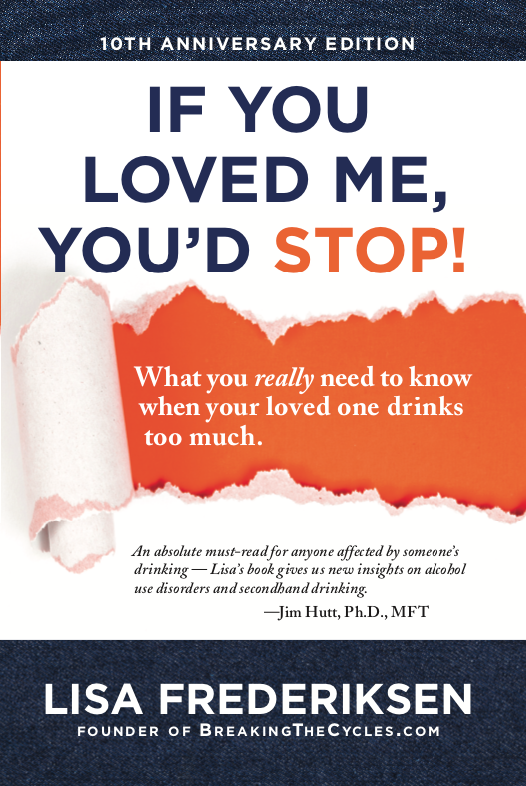The 10th Anniversary edition of “If You Loved Me You’d Stop!: What You Really Need to Know When Your Loved One Drinks Too Much” by Lisa Frederiksen will be released this September. If you read the original when it came out a decade ago, look for updates to the statistics, the resources and tender expansions to the story.
I am the daughter of an alcoholic. My relationship with my mother was a study in contrasts. I loved her dearly. She did her best to protect me from my father’s lectures and rages. But there were times, and then years, where her ability to withstand the mood swings, the pain and the unknown collided with her disease of addiction and she succumbed to a near constant state of withdrawal. And all through my childhood I thought, Am I not worth protecting anymore? Are my sister and my brother not worth protection and care and a goddamned dinnertime?
When money became short and moving became more frequent and disorder became the constant, I would then take over the ‘mom’ role and, with my father’s frequent absences, also became the de facto parent in the family. In my child brain I would repeat the refrain, “If you loved me you’d stop.”
This plaintive plea would then follow me into adulthood where most of my relationships were with people who used and drank. I used and drank. My life continued to center around the disease. I still thought those words “If you loved me you’d stop,” and they were coupled with, “If you loved me you’d make me stop.”
Lisa Frederiksen’s book dives into this complicated behavior and explains why we act the way we do when we are in anyway associated with someone who drinks. She explains that we have a form of that illness, too. Addiction; it’s a killer. Frederiksen has expanded this book to include the direct personal experience of being a child of an alcoholic. It is painful.
Alcoholism is a family disease, and I am not referring only to genetics, but to epigenetics. In addition, the traits and relationship rules one learns in the home are passed down from generation to generation. Even if you don’t drink, the deluded thinking, the controlling behaviors, the need for chaos alternating with the craving for security, just the craziness we become accustomed to, can become the “normal” which is passed on from parent to child.
Frederiksen delves deeply into the science – validating the disease concept but also the healing path. She grounds her work in the research, the new understanding about the brain that has become far more extensive and publicly available. Along with social science and stories from those who suffer, Frederiksen details the ailing process as she also gives us the keys to healing. She builds from a solid foundation of what ‘normal’ drinking is, to a quiz for personal evaluation, to the neurological impacts of drinking. She also gives us the “good news” of neuroplasticity, letting us know that the brain can heal. But she adds, very importantly, that the disease cannot be reversed with love or care for another; these (love and care) can only support recovery.
The age-old question of “Why am I an alcoholic and not [fill in the blank, sister, cousin, friend]?” is addressed. The three contributing factors (brain wiring, genetics and risk factors) are discussed in great detail, including the work of Nadine Burke-Harris with the ACEs study. (Read the book for an incredible in-depth discussion of why the brain disease of alcoholism and addiction follows those with a high ACEs score.)
The final sections of the book lead us on the path out of the dark forest of active addiction and para-alcoholism. After reading Frederiksen’s book, you will have a far greater understanding of this terrible brain disease and will also be able to feel hope for healing.
If you have concerns or questions about living with, or having lived with, an active addict, this book will answer a lot of questions and, more importantly, validate your experience and give you a path out.


